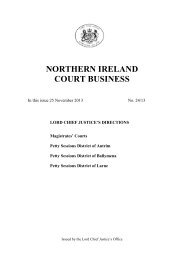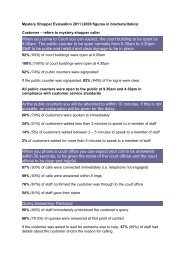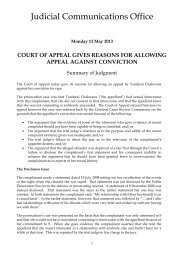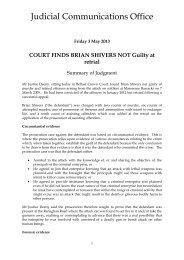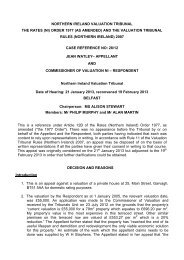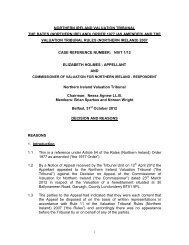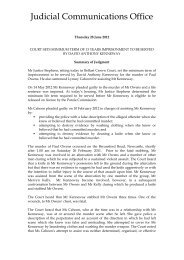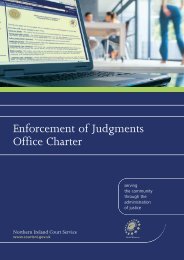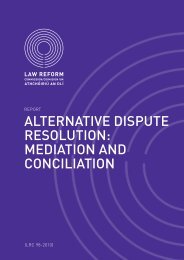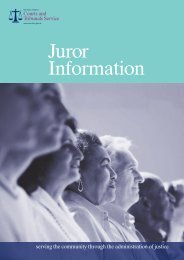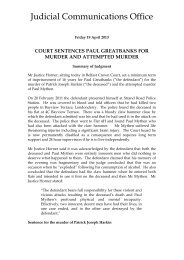A Guide to Bail Applications - Northern Ireland Court Service Online
A Guide to Bail Applications - Northern Ireland Court Service Online
A Guide to Bail Applications - Northern Ireland Court Service Online
You also want an ePaper? Increase the reach of your titles
YUMPU automatically turns print PDFs into web optimized ePapers that Google loves.
<strong>Northern</strong> <strong>Ireland</strong><br />
www.courtsni.gov.uk<br />
A <strong>Guide</strong> <strong>to</strong> <strong>Bail</strong><br />
<strong>Applications</strong><br />
serving the community<br />
through the administration<br />
of justice
serving the<br />
community<br />
through the<br />
administration<br />
of justice<br />
This document can be<br />
made available in a wide<br />
range of alternative formats.<br />
Requests should be made <strong>to</strong><br />
Communications Group.
A GUIDE TO BAIL APPLICATIONS 3<br />
This guide explains the law and procedure in<br />
<strong>Northern</strong> <strong>Ireland</strong> where an adult charged with a<br />
criminal offence applies <strong>to</strong> a court <strong>to</strong> be released<br />
on bail.<br />
Note - Different laws apply where the person<br />
charged is a child under 18 or where the<br />
application is for temporary release on<br />
‘compassionate bail’ - this guide does not deal<br />
with either of those situations<br />
Terminology<br />
For the purposes of this guide:<br />
‘The accused’ means a person charged with a<br />
criminal offence.<br />
‘<strong>Bail</strong>’ means the situation where the accused<br />
is released from cus<strong>to</strong>dy by a <strong>Court</strong> subject <strong>to</strong><br />
them entering in<strong>to</strong> a recognizance <strong>to</strong> appear<br />
before the court again on a specified date.<br />
‘Recognizance’ means an undertaking by the<br />
accused <strong>to</strong> the <strong>Court</strong> whereby they will forfeit<br />
a specified sum of money if they fail <strong>to</strong> attend<br />
for trial or breach a condition of their bail (this is<br />
often referred <strong>to</strong> as the accused’s “own bail”).<br />
‘Surety’ means a person other than the<br />
accused (normally a relative or close friend of<br />
the accused) who gives an undertaking <strong>to</strong> the<br />
<strong>Court</strong> whereby they will forfeit a specified sum<br />
of money if the accused fails <strong>to</strong> attend for trial or<br />
breaches a condition of their bail.
4 SERVING THE COMMUNITY THROUGH THE ADMINISTRATION OF JUSTICE<br />
Introduction<br />
Where a person is charged with a criminal<br />
offence the police may continue <strong>to</strong> detain<br />
the accused in cus<strong>to</strong>dy while they gather<br />
<strong>to</strong>gether the evidence for the prosecution.<br />
Where they wish <strong>to</strong> do so, however, the law<br />
requires the police <strong>to</strong> produce the accused<br />
before a Magistrates’ <strong>Court</strong> no later than the<br />
next day after the day on which the accused<br />
was charged (or the day after that where the<br />
next day is a Sunday, Christmas Day or Good<br />
Friday). The reason the police are required <strong>to</strong><br />
bring the accused before the <strong>Court</strong> is so that<br />
an independent and impartial Judge can review<br />
the lawfulness of the detention and determine<br />
whether the accused should continue <strong>to</strong> be<br />
detained in cus<strong>to</strong>dy until their trial (“remanded in<br />
cus<strong>to</strong>dy”) or released until their trial (“remanded<br />
on bail”).<br />
The law relating <strong>to</strong> whether a person should be<br />
remanded in cus<strong>to</strong>dy or remanded on bail is the<br />
same regardless of whether the application is<br />
being made <strong>to</strong> the Magistrates’ <strong>Court</strong>, the Crown<br />
<strong>Court</strong> or the High <strong>Court</strong>.
A GUIDE TO BAIL APPLICATIONS 5<br />
The Law<br />
Where the accused applies for bail, the Judge,<br />
who is independent and impartial, will make his/<br />
her decision in accordance with the law having<br />
considered all the relevant information placed<br />
before the <strong>Court</strong>. The Judge will, amongst other<br />
things, analyse all the relevant fac<strong>to</strong>rs relating <strong>to</strong><br />
both the individual circumstances of the offence<br />
with which the accused is charged (e.g. the<br />
seriousness of the offence) and the individual<br />
circumstances of the accused (e.g. whether<br />
they have previous convictions). This means<br />
that each application for bail is unique; even<br />
where two people have been charged with an<br />
offence <strong>to</strong>gether (“co-accused”) their individual<br />
bail applications will be unique because their<br />
personal circumstances will differ (e.g. one<br />
co-accused may have previous convictions for<br />
similar offences whereas the other co-accused<br />
has not).<br />
(i) The Presumption in Favour of <strong>Bail</strong>:<br />
The law relating <strong>to</strong> bail applications is governed<br />
by Article 5 of the European Convention on<br />
Human Rights. The basic principle contained<br />
within Article 5 is that an accused must always<br />
be released pending their trial unless the<br />
prosecuting authorities can show there are<br />
“relevant and sufficient” reasons <strong>to</strong> justify their<br />
continued detention (this is commonly known as<br />
“the presumption in favour of bail”).
6 SERVING THE COMMUNITY THROUGH THE ADMINISTRATION OF JUSTICE<br />
(ii) The Grounds for Refusing <strong>Bail</strong>:<br />
The “relevant and sufficient” reasons which may<br />
permit the accused <strong>to</strong> be remanded in cus<strong>to</strong>dy<br />
rather than being granted bail (also known as the<br />
“grounds for refusing bail”) are limited <strong>to</strong>:<br />
• Risk that the accused will fail <strong>to</strong> appear for<br />
trial if they are released on bail;<br />
• Risk that the accused will interfere with<br />
the course of justice while on bail (e.g. that<br />
they will destroy evidence that could be<br />
used against them at their trial or that they<br />
could interfere with witnesses who are due<br />
<strong>to</strong> give evidence at their trial);<br />
• Risk that the accused will commit further<br />
offences while on bail;<br />
• The accused would be at risk of harm<br />
(from himself/herself or from others)<br />
against which they would be inadequately<br />
protected if released on bail; or<br />
• Risk <strong>to</strong> the preservation of public order if<br />
the accused is released on bail.<br />
These five grounds are the only grounds on<br />
which bail can be lawfully refused. <strong>Bail</strong> cannot<br />
be refused simply because the accused has<br />
been charged with a very serious offence; but<br />
the seriousness of the offence can be taken in<strong>to</strong><br />
consideration as a fac<strong>to</strong>r in determining if one of<br />
the five grounds for refusing bail exists (e.g. the<br />
seriousness of the offence may increase the risk<br />
that the accused will fail <strong>to</strong> appear for their trial).
A GUIDE TO BAIL APPLICATIONS 7<br />
The burden of proving <strong>to</strong> the Judge that one or<br />
more of the five grounds for refusing bail exists<br />
rests on the prosecution. If the prosecution fails<br />
<strong>to</strong> do so, then the presumption in favour of bail<br />
prevails and the Judge will remand the accused<br />
on bail.<br />
(iii) <strong>Bail</strong> Conditions:<br />
Where, however, the Judge is satisfied on the<br />
evidence presented <strong>to</strong> him/her that one or more<br />
of the grounds for refusing bail has been proven<br />
by the prosecution, the Judge must assess<br />
whether there are any ‘bail conditions’ which<br />
could be imposed which would sufficiently<br />
alleviate the relevant risk contained within the<br />
ground(s) for refusing bail. Where the Judge<br />
is satisfied that a condition, or combination<br />
of conditions, is sufficient <strong>to</strong> alleviate the risk<br />
contained in the relevant ground(s) for refusing<br />
bail, the accused will be released on bail subject<br />
<strong>to</strong> those conditions.<br />
Examples of bail conditions which may be<br />
considered by the Judge include:<br />
• One or more sureties.<br />
• The accused must reside at a specified<br />
address (which may not necessarily be<br />
the address where they were living before<br />
being charged with the offence).<br />
• The imposition of a curfew whereby<br />
the accused must be inside the house<br />
between certain hours (such a condition<br />
may also contain a requirement that the
8 SERVING THE COMMUNITY THROUGH THE ADMINISTRATION OF JUSTICE<br />
accused wear an electronic tag which<br />
moni<strong>to</strong>rs their presence in the house<br />
during the hours of curfew).<br />
• The accused must not enter a defined<br />
geographical area.<br />
• The accused must not contact, directly or<br />
indirectly, certain specified persons (e.g.<br />
the alleged injured party or a co-accused).<br />
• The accused must not drink alcohol (such<br />
a condition may also contain a requirement<br />
that the accused must submit <strong>to</strong> a breath<br />
test if the police suspect the accused has<br />
been drinking alcohol).<br />
• The accused must not enter any licenced<br />
premises (e.g. pubs, nightclubs or certain<br />
restaurants).<br />
• The accused must not take any drugs<br />
which have not been prescribed <strong>to</strong> them<br />
by a doc<strong>to</strong>r.<br />
• The accused must surrender their<br />
passport.<br />
• The accused must not use the internet or<br />
any device which is capable of accessing<br />
the internet.<br />
• The accused must not drive any form of<br />
mo<strong>to</strong>r vehicle.<br />
• The accused must not be a passenger in/<br />
on any form of private mo<strong>to</strong>r vehicle
A GUIDE TO BAIL APPLICATIONS 9<br />
The above list is not exhaustive and the wording<br />
of any bail condition(s) is dependent on the<br />
individual circumstances of the case and the risk<br />
it is seeking <strong>to</strong> alleviate. Any bail condition, or<br />
combination of bail conditions, however, must<br />
be proportionate <strong>to</strong> the legitimate aim which it<br />
seeks <strong>to</strong> achieve (e.g. an accused should not be<br />
prohibited from entering the whole of a county<br />
simply <strong>to</strong> ensure that they do not frequent a<br />
particular street in a particular <strong>to</strong>wn).<br />
Where the Judge, however, is not satisfied that<br />
a condition, or combination of conditions, would<br />
sufficiently alleviate the risk contained in the<br />
relevant ground(s) for refusing bail, the accused<br />
will be remanded in cus<strong>to</strong>dy.<br />
(iv) Reasons for the Decision:<br />
Where the Judge remands the accused on bail<br />
subject <strong>to</strong> conditions, the Judge will state in<br />
open court the reasons for imposing the bail<br />
conditions in respect of the risk they are aimed<br />
at alleviating.<br />
Where the Judge remands the accused in<br />
cus<strong>to</strong>dy, the Judge will explain in open court the<br />
ground(s) on which bail is being refused.<br />
(v) Appeals:<br />
Where a Magistrates <strong>Court</strong> or the Crown<br />
<strong>Court</strong> refuses bail and remands the accused<br />
in cus<strong>to</strong>dy, the accused has the right <strong>to</strong> make<br />
a fresh application for bail <strong>to</strong> the High <strong>Court</strong>.<br />
The proceedings in the High <strong>Court</strong> will take the
10 SERVING THE COMMUNITY THROUGH THE ADMINISTRATION OF JUSTICE<br />
form of a fresh bail hearing independent of the<br />
bail application in the Magistrates’ <strong>Court</strong> or the<br />
Crown <strong>Court</strong>, as the case may be.<br />
Where a Magistrates’ <strong>Court</strong> grants the accused<br />
bail (whether or not bail conditions have<br />
been imposed) the prosecution may appeal<br />
that decision <strong>to</strong> the High <strong>Court</strong>. Where the<br />
prosecution lodge such an appeal the accused<br />
will be detained until the determination of the<br />
appeal by the High <strong>Court</strong>. The proceedings in<br />
the High <strong>Court</strong> will take the form of a fresh bail<br />
hearing independent of the bail application in the<br />
Magistrates’ <strong>Court</strong>.
Should you require<br />
any further information<br />
about the NI <strong>Court</strong>s and<br />
Tribunals <strong>Service</strong> please<br />
visit our website at<br />
www.courtsni.gov.uk or<br />
alternatively contact our<br />
Communications Group.
<strong>Northern</strong> <strong>Ireland</strong> <strong>Court</strong>s and Tribunals <strong>Service</strong><br />
Communications Group<br />
Laganside House<br />
23-27 Oxford Street<br />
Belfast BT1 3LA<br />
Phone: 028 9032 8594<br />
Fax: 028 9072 8942<br />
Textphone: 028 9041 2920<br />
Email: communicationsgroup@courtsni.gov.uk<br />
www.courtsni.gov.uk<br />
April 2013



